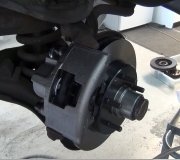Actually, they are two different types of rubber that are compatible with different fluids. Brake fluid is a glycol product, not petroleum-based. More information can be found in automotive textbooks. I never required my students to memorize the names of the types of rubber because that wasn't going to help them fix cars efficiently. It was just important they understood that there is a difference.
I did a demonstration every year to show how critical it was to keep the brake fluid clean. I dropped two rubber wheel cylinder seals into a pair of beakers with new brake fluid and let them sit for a week. In one of them I added a drop of power steering fluid into the inch of brake fluid. By the end of the week the contaminated seal had grown by about 20 percent and was real mushy.
You can prove this to yourself too by pulling out a seal from an old wheel cylinder and dropping it in some power steering fluid for a few days. The funny thing is when you pull it out and wash it off, it will appear to shrink back to normal in a few days, but you'll find it still feels soft and sticky instead of hard and slippery.
I don't know what the ramifications are of using alcohol to flush the steel lines. To be safe, use brake parts cleaner in a spray can. It's made specifically for brake parts. It works like carburetor cleaner but it evaporates slower so it has more time to dissolve contaminants and clean it out.
SPONSORED LINKS
Monday, September 26th, 2011 AT 5:00 AM




